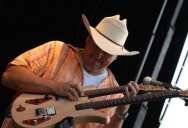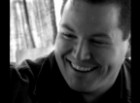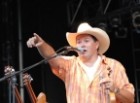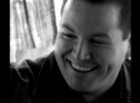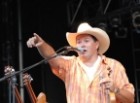As someone who’s travelled North America appearing on some of the biggest stages of country music and come back home to launch his solo career, one can expect Donny Parenteau to be full of confidence. And indeed, this self-proclaimed “natural born entertainer” has proven he can walk the walk. With a score of local successes - including five 2007 Saskatchewan Country Music Awards - and a new album, Donny is ready to step into the national spotlight.
Something of a prodigy, Donny taught himself to play fiddle by ear at the age of 15 and was performing professionally by 19. Why the fiddle? “I just liked the way the instrument looked,” he states. “There was a broken fiddle in the closet, and once I made up my mind, I pestered my dad to repair it right away. I took to it naturally; I could hear fiddle melodies in my head and figure out how to play them.” Although he never knew him, Donny's grandfather had been a well-known fiddle player. “In Prince Albert, you’re either in hockey or music.
I sucked so bad at hockey, I chose music,” he chuckles. He found himself drawn to the “southern style” of fiddle playing, or Western Swing, a style with more bowing - and was influenced by local players such as Brian Sklar, Freddie Pelletier and George Pistun. “When I first heard Western Swing, I found my destiny…it’s such a free style of playing.” He would continue on to master the mandolin, acoustic and electric guitars and the unique double-neck mando-caster/electric guitar.
Donny would join the ranks of a growing list of Prince Albert-bred musicians working with U.S. country stars. We talk about Rod Jansen (on the road with Dierks Bentley) and Randall Currie (playing with Brad Paisley), fellow musicians he crossed paths with while on North American tours. “They were literally asking, ‘What the h*ll’s in the water up there?’ when the three of us were introduced as being from P.A.”, he laughs. Donny notes that Saskatchewan audiences are among the toughest anywhere; perhaps that raises the bar. “If you ever get a standing ovation in Saskatchewan…well, you have done something! I think we always strive and work harder to do better because [here] they are more reserved with their applause…There’s gotta be some sort of a fire inside us to prove a point and play when we get down [to the U.S.]. I think that’s the thing that makes us a little different.”
While playing an Edmonton club in ’91, a band mate invited Donny along to a show by up-and-comer Neal McCoy, also playing in town. Without knowing who Neal was, they arranged to get backstage to meet him. Chatting with Neal and his band, Donny discovered similar tastes in music and an instant bond; they happened to be looking for a fiddle player to complete the group, but they didn’t have the money to hire one. Donny persisted for the chance to audition anyway. He listened to the group jamming out a new original of Neal’s, and when he was invited up to perform, he already had a grasp on the song and chose it as his audition piece. As he describes it, “We fed off each other, and it just gelled.” They then went to bat for him, as each band member offered to take a personal pay cut so they could afford to bring Donny on board.
Twelve years on the road with Neal (who during that time turned into a bona-fide country star with three platinum albums), garnered Donny opportunities like opening up for Merle Haggard, Tim McGraw, Faith Hill, Buck Owens, George Jones, Charlie Pride, Loretta Lynn, Charlie Daniels, Hank Williams Jr., Reba McEntire, Garth Brooks and Shania Twain, and appearances on the Grand Ole Opry and The Tonight Show with Jay Leno. Donny and Neal have similar senses of humour, which one can hear coming through on their recordings. Donny says they’re both also perfectionists. “I was always working on the next show. I would be the one band member that would go back to my room, instead of going out to a club…I didn’t dwell on what I’d played well that night - I thought about the next show. I felt I had to prove myself, and had this overwhelming desire to always get better.” Donny was the only member of the live band who would always appear on Neal’s recordings - and even that decision was with the full support of the rest of Neal's band.

“What made Neal’s live show great was this ‘energy ball’,” he says. “When you’re having fun with your band members, it projects way out into the crowd and comes back tenfold…which makes you play harder.” Along the way, Donny had the opportunity to bring old friend Sean Carson into the Neal McCoy fold. “I played for Sean and his father Grant when I first got started. We had a pact back then, that if one of us ‘made it’ first we’d help the other out. When an opening came up, I suggested Sean…and he’s still playing with him today.”
Donny also took notes on the way Neal dealt with his fans, always taking time to meet people and network. “You meet every type of person when you’re playing in a bar six nights week,” he notes. “My father was a very outgoing guy, and I think I got that personality from him. In fact, if you’re an artist and you’re not going out and meeting the public, you’re just cutting ties.” One night Donny had the chance to meet Hank Williams Jr. They’d just finished their opening spot, including an Aerosmith cover fronted by Donny, unaware that it was a song that Williams had in his own set. “Not a good way to meet me, is it, son?” the infamous singer roared as he shook Donny’s hand.
Then one day Donny woke up and decided it was time to move on. Playing between 250-300 shows a year, and on the road at times for months on end, he felt like he was no longer in control of his own life. “I was starting to not enjoy what I was doing, and I had to walk away.” The night he decided to announce his decision, they made their appearance on the Grand Ole Opry. He remembers standing in the famed “circle” with his band mates - a six-foot circle of dark oak wood cut from the stage of the Opry's famous former home, the Ryman Auditorium and embedded into the new stage. It was a bittersweet moment, as he felt like he was leaving a family. On one of his previous visits home he’d put together a band to have a test run as a front man. “I proved to myself I could do it, and then I left it alone.” It wasn’t until some time after he’d quit Neal’s band that, at the urging of friends, he made the decision to move back home and start his own band. “I really missed the mentality of being in Saskatchewan…there’s a humbleness about being from here. I had only been able to come home a couple times a year, and had to cram everything into short visits.” Now as a front man, “It’s all about the connection with the fan, and I've always understood that,” he says. “I really have a point to prove every time…that I deserve to be up there.”
Donny says the songwriting bug first bit while he was out on the road with Neal; he and bassist Lorne O’Neil started collaborating to pass the time during long stretches of travel. “I wish I’d had the knowledge of songwriting back then (when I was on the road), as I had so many opportunities to pitch songs…It’s so much easier when you’re in that circle, and there’s a personal connection with the artists.” Donny says he now enjoys songwriting as much as playing. His songs have been well received; radio perked their ears when he previewed “Postmarked Heaven” - a Gil Grand co-write at an SCMA awards show. “The song hadn’t been recorded yet so it was a bit of a risk to perform, but after we finished I had radio people coming up and asking when it would be available,” he says. The song, written for his late father, can be found on his new album What It Takes (released October 2006) The Gil Grand connection is another example of Donny opening his own doors; Donny freelanced on one of Gil’s Saskatchewan dates; they met again when Gil was in Saskatchewan to participate in the SCMA weekend, and Donny approached him to co-write.
In the planning of his shows, it’s all about entertainment value. “I sit back and think, how do I look on stage? I picture myself out front, and as a fan I’m thinking ‘impress me’. A lot of people listen with their eyes. So we do things visually, like the way the different instruments are placed around me on stage, and are changed up throughout the show. That’s something I learned watching Ricky Skaggs. The guys in my band contribute - for example, Boyd also plays banjo so we can switch things up there too. I give them entertainment, I give them vocals, I give them original material, and I give them instrumentals. You have to win the fans over, and it’s a slow climb.” Now, performing his own songs in his shows, Donny says, “To have someone singing your own material back at you…it’s really cool.”
Donny is proud of his live band, consisting of Boyd Faulconer on guitar and banjo, Blaine Yandt on bass and Jayson Brinkworth on drums. It’s a fast-paced show with plenty of showmanship, stacked harmonies and camaraderie. “I love working with musicians who have a solid connection,” Donny says. “For example, when Jayson changes up what he’s playing he can make me change the way I play a phrase.” He says he learnt a lot by watching how Neal McCoy treated his players, and that in turn Neal was mentored by the legendary Charlie Pride. The lesson: “Treat your people with respect, and you’ll get it back.”
What It Takes was co-produced by Steve Fox; they met while Donny was playing fiddle on The Poverty Plainsmen’s album Lap of Luxury, which Steve was producing. Much of the beds for Donny’s album were recorded with Steve in Nashville at a breakneck pace, with twelve songs laid in about six hours. Steve also contributed heavily to the lush vocal arrangements. Eddie Bayers, who performed drums on the album, was a musician who had previously worked with Donny on Neal McCoy albums. Donny, as co-producer, credits much of his knowledge to having watched legendary producers Barry Beckett, James Stroud and Kyle Lehning work on Neal’s albums. It all seems to have come full circle.
The album contains twelve songs written by Donny, with co-writers Anthony Kelly, Gil Grand, Lorne O’Neil, Lenny Wallace and Boyd Faulconer. They range from the catchy, up-tempo “Backyard Swing” to heartfelt “Cold Virginia Rain”. The current single, “Father Time”, was another song written for his late father. It’s a catchy, radio-friendly track that can pack the dance floor. For help in promotions, Donny has enlisted Irene “The Hurricane” Carroll of I See Associates. “A really good publicist is the best investment you can make,” he says. Along with radio tracking by Bob Martineau, and Donny’s wife Patricia as his acting manager, the team has put together a strategy that is hoping to break Donny outside of Western Canada. “I will continue to be 100% me - I won’t necessarily adapt to the industry. When the phone stops ringing, that’s when you have to worry,” he chuckles. With a jam-packed summer performance schedule, that doesn’t look to be happening any time soon.
Highlights for Donny and the band include the Aboriginal Peoples’ Choice Awards in Winnipeg, where they’re scheduled to perform on the awards show. He’s hoping to be a part of the Canadian Aboriginal Music Awards in November (he played on that show in ’05 as part of the house band, as well as doing his own solo performance). He’ll be performing two songs on APTN, to be aired live from Winnipeg in honour of National Aboriginal Day on June 21. He’s excited about Waniska, to be held in Prince Albert this fall. And, he’s working on putting together the Duck Lake Country Revival, a festival for Northern Saskatchewan, with a focus on presenting Aboriginal bands and up-and-coming singers.
Donny's philosophy appears to be, “Make your own opportunities.” It’s worked well for him so far. “If I visualize it, it happens,” he says. He’s achieved the goals he set out for himself in his current five-year plan, including a nomination for Fiddle Player of the Year at the 2006 Canadian Country Music Awards. And on the horizon for Donny? “Playing the Opry is, for music, like winning the Stanley Cup. My goal is to be back there again - but this time as me being the artist.” He’s also hoping for nominations at this year’s Canadian Country Music Awards. Performing will continue to be a top priority; as he notes, “The more you work with your band, the tighter you get.” He’s hoping to expand his tour schedule to the U.S. and Europe, and would love to be a Métis cultural representative for Canada abroad. In reference to his heritage, Donny says “Métis music is all about heart and soul, and being 100% yourself.”
Donny enjoys mentoring up and coming artists, and has this to offer: “Follow your gut. Keep your passion and desire focussed. Don’t believe the hype people tell you - just believe in yourself. And don’t treat it like a hobby - you get out of this business what you put into it.”
“I made a promise to my dad to take the family name as far as I could…so far it’s on over five million albums sold by Neal McCoy; now I’m working on doing it on my own.”
Awards and Acknowledgements:
Producer of the Year, Donny
Parenteau and Steve Fox,
SCMA 2007
Aboriginal Artist of the Year,
SCMA 2007 (fourth consecutive year)
SCMA All Star Band – Fiddle,
SCMA 2007 (fifth
consecutive year)
Back-up Band of the Year,
SCMA 2007
All Star Band – Specialty
Instrument, SCMA 2007
‘Fiddle and Mandolin Master’
by the Celestial Order of
Musicians
Nominations:
Fiddle Player of the Year,
CCMA 2006
Producer of the Year,
Canadian Aboriginal Music Awards 2006
https://www.donnyparenteaumusic.com/

